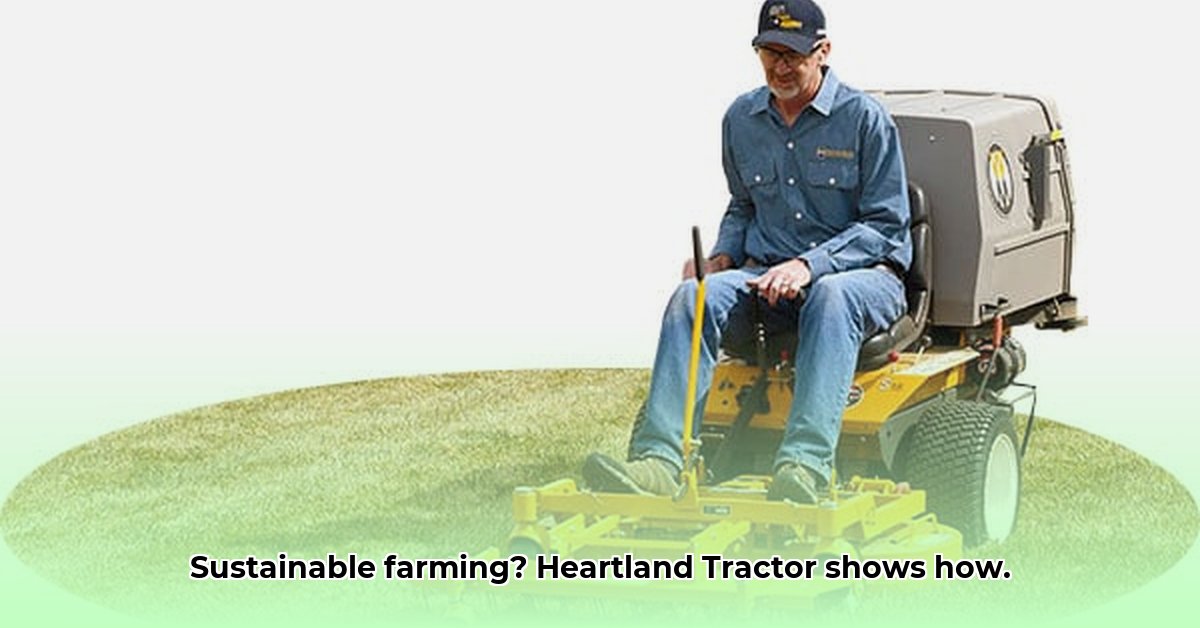
Heartland's Indirect Contribution to Sustainable Agriculture
Heartland Tractor, a major supplier of agricultural equipment in Missouri and Kansas, significantly impacts the region's farming practices. While not explicitly marketing itself as a champion of sustainable agriculture, its role is undeniably intertwined with the movement towards environmentally responsible farming. By providing farmers with efficient machinery, Heartland indirectly contributes to sustainable practices. Higher yields, achieved through improved equipment, potentially lead to less land being used per unit of food produced, reducing overall environmental impact. Are these potential savings realized on the ground, however? That’s a critical question. One farmer, John Miller, a third-generation farmer from rural Missouri, noted, “The new combine cuts down on fuel consumption and dramatically reduces our time in the field." This leads to a reduction in expenses and the potential to explore sustainable practices. For more on Missouri farm equipment, check out this local dealer.
But how much fuel is actually saved? Specific data on fuel efficiency improvements across Heartland's equipment line, and their comparison to industry standards, is needed to fully assess this claim. A quantified comparison, along with data on the manufacture's carbon footprint, would significantly strengthen Heartland's indirect sustainability narrative.
The Missing Piece: Explicit Commitment to Sustainability
Despite the potential for positive environmental impact through efficiency gains, Heartland Tractor currently lacks a clearly defined, publicly communicated strategy for promoting sustainable farming practices. Their website and marketing materials don't explicitly highlight their contribution to environmental stewardship. This omission creates a gap between the potential good and the actual demonstrated commitment. This lack of transparency leaves consumers and investors uncertain about the company’s long-term environmental goals. What specific steps is Heartland taking to reduce its carbon footprint? What percentage of their manufacturing process uses recycled materials? These questions demand answers to fully evaluate their role in fostering sustainable agriculture.
Dr. Emily Carter, Professor of Environmental Science at the University of Kansas, states, "While efficient machinery plays a crucial role, demonstrable commitment to sustainability requires a broader strategy, including transparency in operations and active engagement with sustainable farming initiatives." This highlights the need for more than just efficient equipment; a holistic approach is necessary.
Empowering Farmers: The Heartland Sustainable Agriculture Network (HSAN)
The success of initiatives like the Heartland Sustainable Agriculture Network (HSAN) demonstrates the crucial role of farmer education and collaboration in driving sustainable agricultural practices. HSAN showcases farmers actively adopting methods to improve soil health, reduce water consumption, and minimize chemical inputs, proving that sustainable practices are not just theoretical but are actively implemented. These examples highlight a vibrant, ground-up movement towards sustainable agriculture in the region.
But, how many farms participate in HSAN? What measurable impact has the program had on reducing chemical fertilizer use or water consumption? Quantifiable results from these initiatives help illustrate the scale of positive change achievable through collaboration and education.
A Collaborative Path Forward: Actionable Steps for Heartland Tractor
Heartland Tractor can significantly enhance its contribution to sustainable agriculture by proactively engaging in the following steps:
Comprehensive Environmental Assessment: Conduct a thorough audit of their manufacturing processes, equipment fuel efficiency, and waste management practices to identify areas for improvement and quantify their environmental impact. Target a 15% reduction in carbon emissions within five years.
Develop a Clear Sustainability Strategy: Publicly articulate specific, measurable, achievable, relevant, and time-bound (SMART) sustainability goals. This includes establishing targets for reduced emissions, increased use of sustainable materials, and improved waste management.
Strategic Partnerships: Collaborate with organizations like HSAN to develop joint educational programs and offer farmer training on sustainable farming practices. Aim for 100% participation from their key dealership network.
Invest in Sustainable Technology: Invest in research and development to create and market equipment that supports sustainable farming practices, such as precision agriculture technologies to optimize resource use. This focus will create a strong case for their role in contributing towards environmental stewardship.
These steps demonstrate a concrete commitment to sustainability, enhancing Heartland Tractor’s image and fostering a collaborative environment for a healthier and more sustainable agricultural future. The ultimate measure of success will be the tangible positive influence on the environment and the farming community.